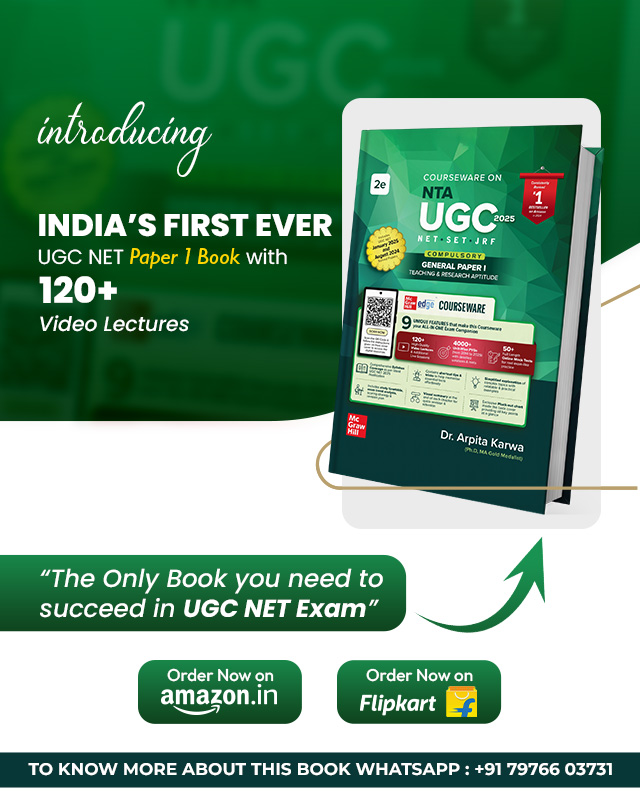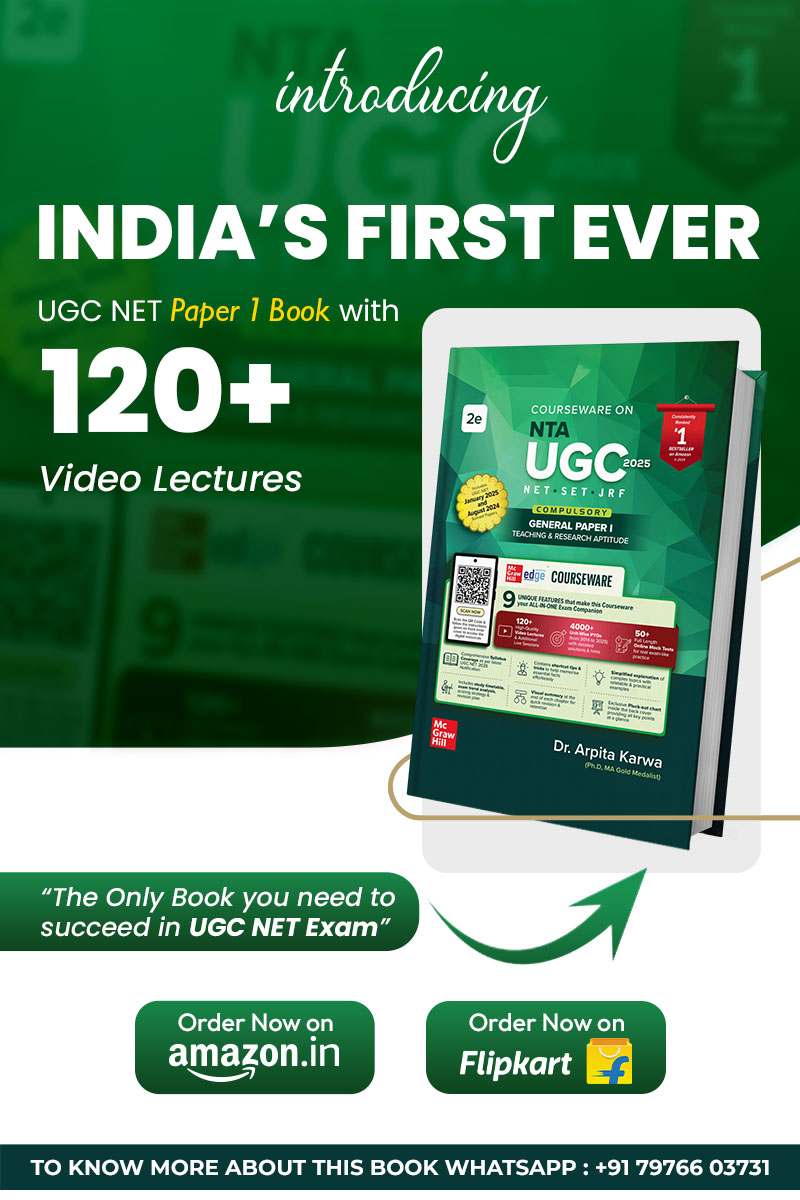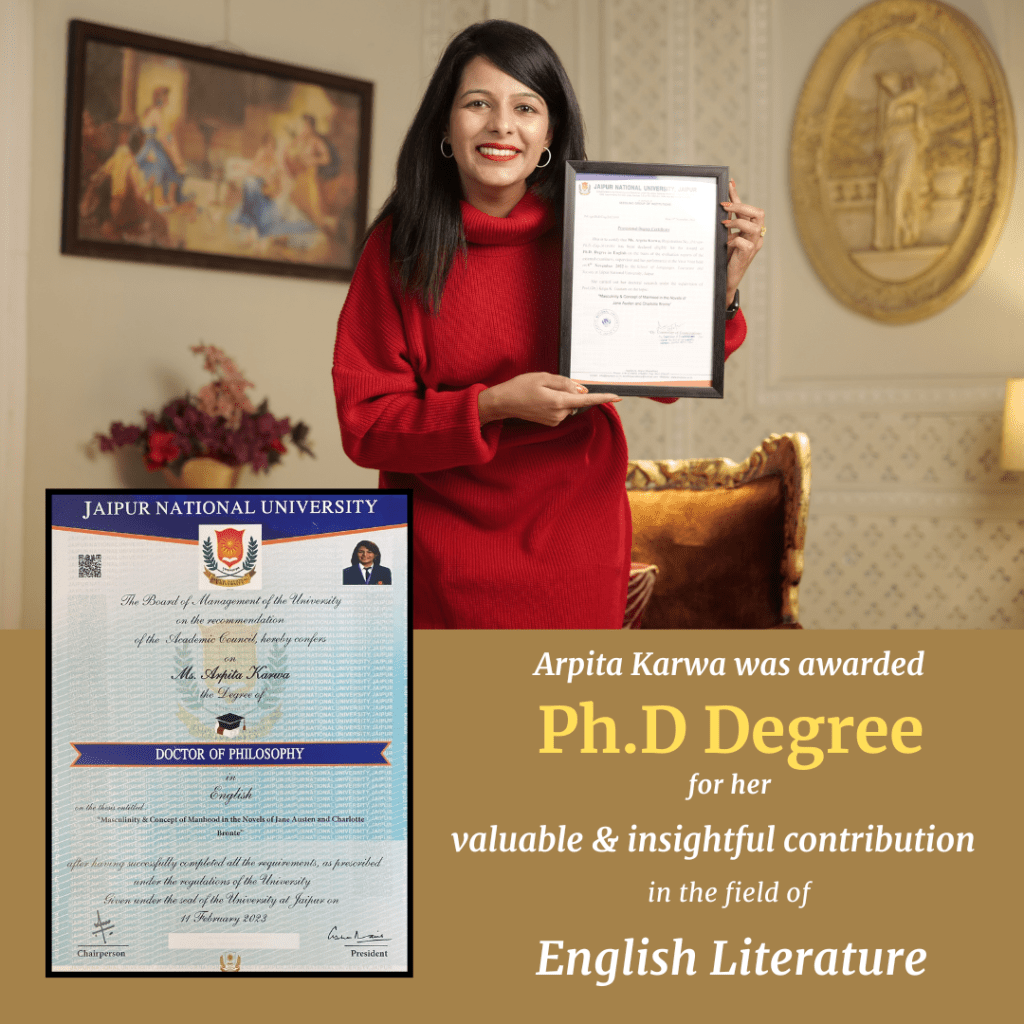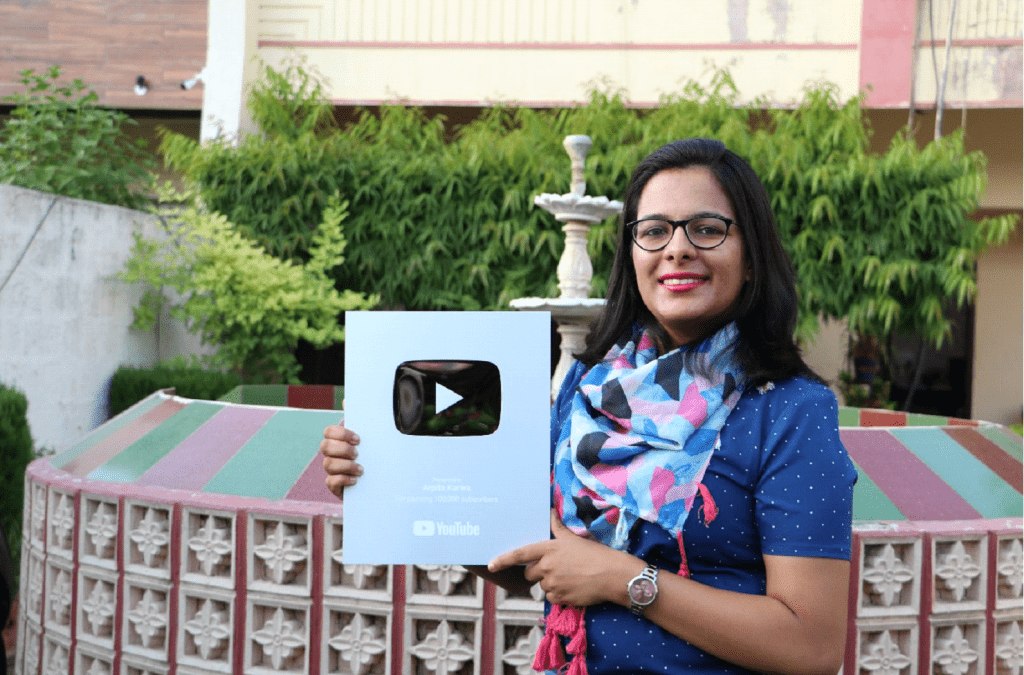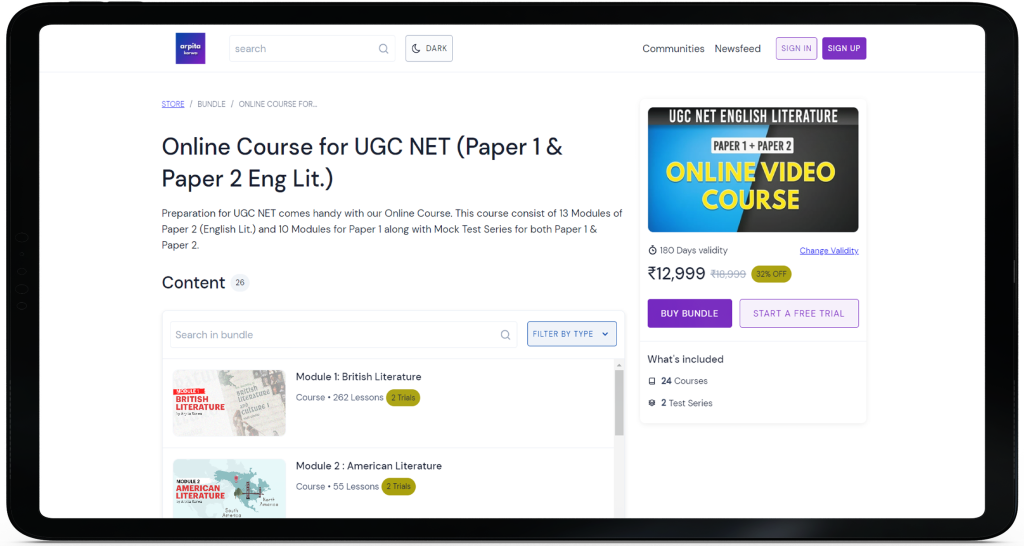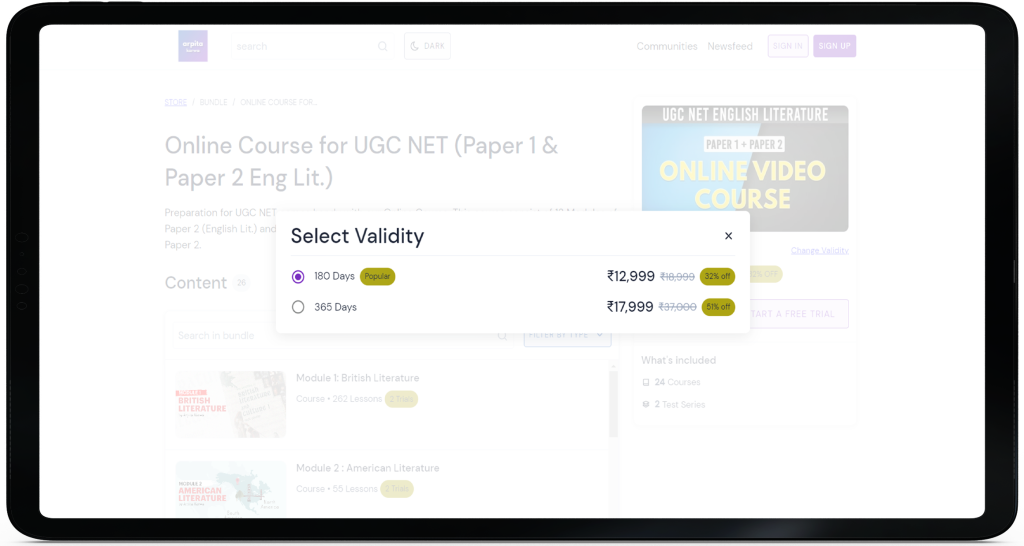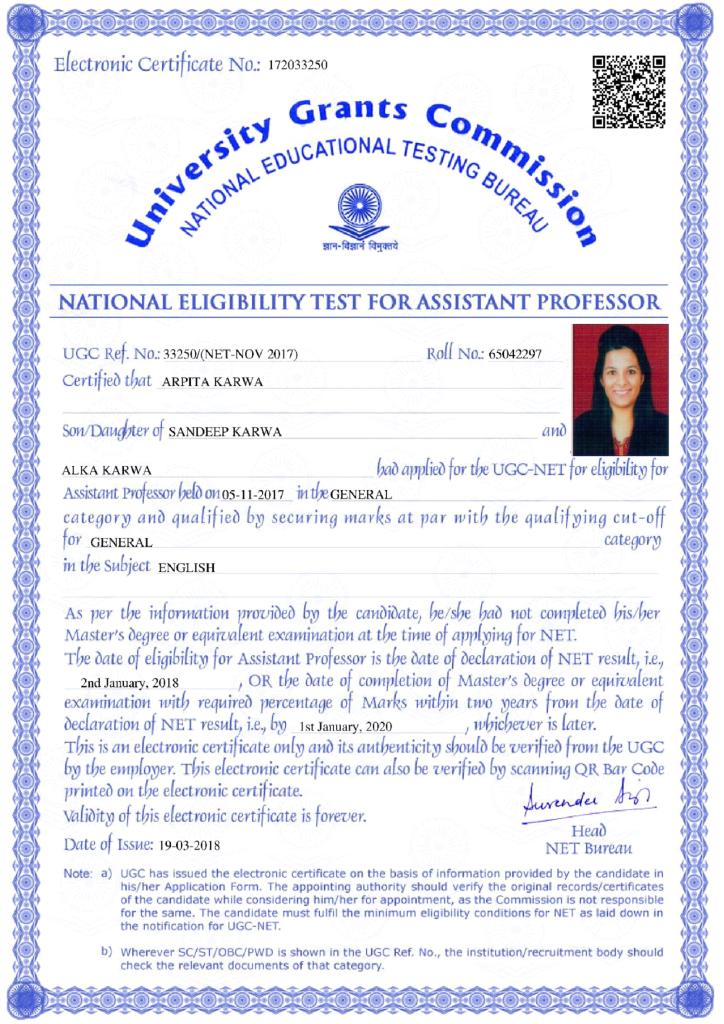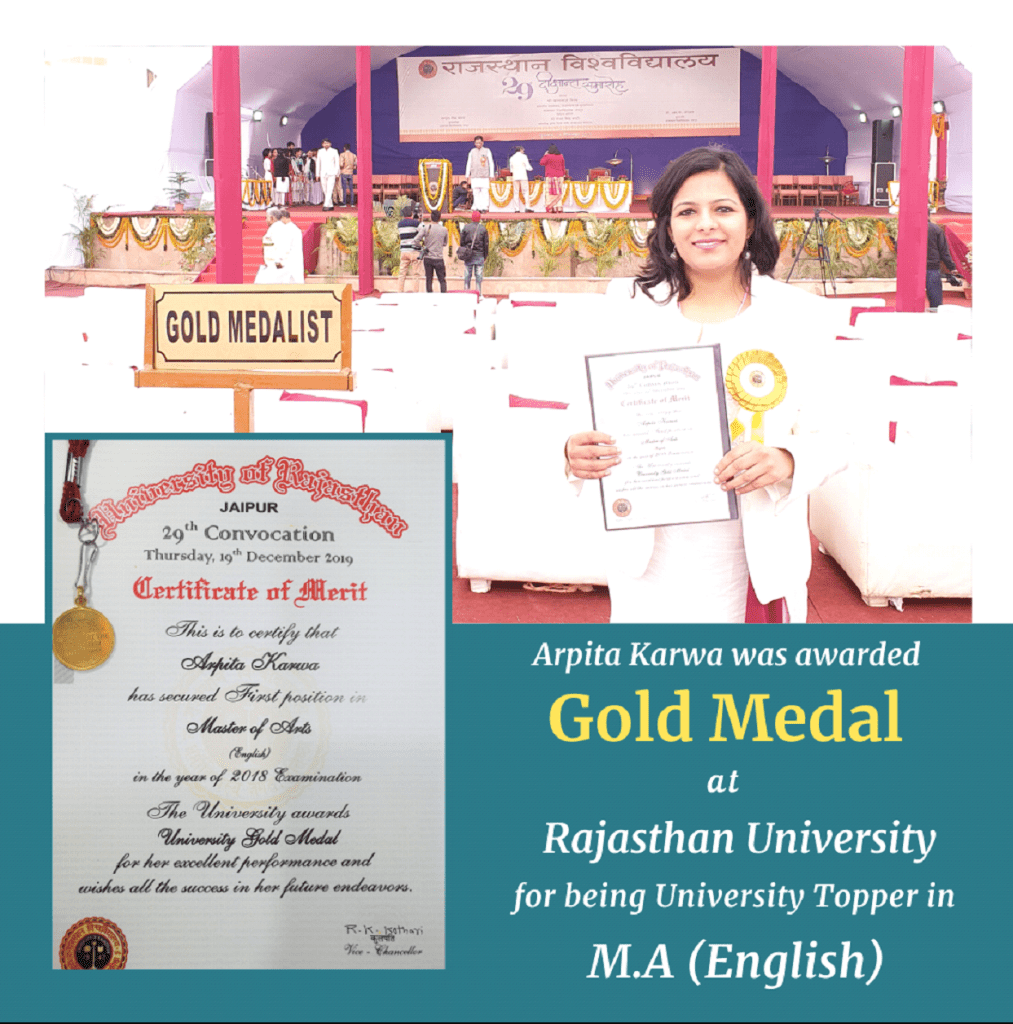14th June 2023 (Paper 2 English Literature) Shift 2
December 7, 2023 2023-12-12 19:1614th June 2023 (Paper 2 English Literature) Shift 2
14th June 2023 (Paper 2 English Literature) Shift 2
NET QUESTION PAPER
June 2023 (Shift 2)
Paper 2 (English Literature)
Q.1) The following lines are from one of the poems of D. H. Lawrence. Identify the poem?
“And so, I missed my chance with one of the lords
Of life.
And I have something to expiate;
A pettiness.
1) Bat
2) Snake
3) Mosquitoe
4) Cypresses
Answer:2) Snake
Q.2) Match List I with List II
| LIST I | LIST II | ||
|---|---|---|---|
| A | Pratap Sharma | I | Sleepwalkers |
| B | Asif Currimbhoy | II | Mira |
| C | Gurcharan Das | III | A Touch of Brightness |
| D | Nissim Ezekiel | IV | The Hungry Ones |
Choose the correct answer from the options given below:
1) A-II, B-IV, C-I, D-III
2) A-IV, B-III, C-II, D-I
3) A-III, B-IV, C-I, D-II
4) A-III, B-IV, C-II, D-I
Answer: 4) A-III, B-IV, C-II, D-I
Q.3) Who enunciated the idea of myth as depoliticized speech in bourgeois society?
1) Louis Althusser
2) Michel Foucault
3) Richard Hoggart
4) Roland Barthes
Answer: 4) Roland Barthes
Q.4) In the context of ‘nature-nurture’ debate in Linguistics, there is a view that there must be an innate core of abstract knowledge about language form, which pre-specifies a framework for all natural human languages and is currently known as ‘Universal Grammar. Among the following, who is the linguist proposing this view?
1) Claude Levi-Strauss
2) Noam Chomsky
3) Roland Barthes
4) Richard Rorty
Answer:2) Noam Chomsky
Q.5) Which among the following was not recognized as a major dialogue of Plato?
1) Crito
2) Phaedo
3) Symposium
4) Metaphysics
Answer:4) Metaphysics
Q.6) Which of these did Macaulay’s 1835 Minutes on Indian Education want to create?
1) A class of people Eurasian by blood but European by taste
2) A class of people Indian by blood but English by taste
3) A class of people Indian by blood but multinational in identity
4) A class of people European by blood but Oriental by taste
Answer:2) A class of people Indian by blood but English by taste
Q.7) Match List I with List II
| LIST I | LIST II | ||
|---|---|---|---|
| A | When I found myself on my feet, I looked about me, and must confess I never beheld a more entertaining prospect. The country round appeared like a continued garden, and the inclosed fields, which were generally forty-foot square, resembled so many beds of flowers. | I | A Description of a City Shower |
| B | There is likewise another great advantage in my scheme, that it will prevent those voluntary abortions, and that horrid practice of women murdering their bastard children, alas, too frequent among us, sacrificing the poor innocent babes, I doubt, more to avoid the expense than the shame, which would move tears and pity in the most savage and inhuman breast. | II | Gulliver’s Travels |
| C | Having to no purpose used all peaceable endeavors, the collected part of the semen, raised and inflamed, became adult, converted to choler, turned head upon the spinal duct, and ascended to the brain. | III | A Modest Proposal |
| D | Sweeping from butchers’ stalls, dung, guts, and blood, Drowned puppies, stinking sprats, all drenched in mud, Dead cats, and turnip tops, come tumbling down the flood. | IV | A Tale of Tub |
Choose the correct answer from the options given below:
1) A-IV, B-III, C-II, D-I
2) A-II, B-III, C-IV, D-I
3) A I, B-II, C-III, D-IV
Answer: 2) A-II, B-III, C-IV, D-I
Q.8) Which of the following explains the difference between Conceptual Research and Empirical Research?
1) The former of the two is related to some abstract idea(s) or theory, and the latter relies on experience and observation alone.
2) The former of the two is based on the measurement of quantity or amount, and the latter is concerned with qualitative phenomena.
3) The former of the two includes surveys and fact-finding enquiries, and the latter uses information already available to make a critical evaluation of the material
4) The former aims at finding a solution for an immediate problem, and the latter is concerned mainly with generalizations and formulation of theory.
Answer:1) The former of the two is related to some abstract idea(s) or theory, and the latter relies on experience and observation alone.
Q.9) Match List I with List II
| LIST I | LIST II | ||
|---|---|---|---|
| A | Culture and Environment | I | Gayatri Chakravorty Spivak |
| B | In Other Worlds: Essays in Cultural Politics | II | FR Leavis and D Thompson |
| C | The Cultural Turn: Selected Writingson the Postmodern, 1983- 1998 | III | Fredric Jameson |
| D | The Uses of Literacy | IV | Richard Hoggart |
Choose the correct answer from the options given below:
1) A-I, B-II, C-III, D-IV
2) A-II, B-I, C-III, D-IV
3) A-IV, B-II, C-III, D-I
4) A-III, B-I, C-II, D-IV
Answer: 2) A-II, B-I, C-III, D-IV
Q.10) Who among the following is the author of the novel titled Typee: A Peep at Polynesian Life?
1) Walt Whitman
2) Herman Melville
3) Mark Twain
4) Tennessee Williams
Answer: 2) Herman Melville
Q.11) Arrange the chronological sequence in which the following works were published:
A) Reflections on the Revolution in France
B) Preface to Shakespeare
C) The Social Contract
D) Treatise on Human Nature
E) Enquiry Concerning Human Understanding
Choose the correct answer from the following options:
1) A, B, C, D, E
2) C, A, B, E, D
3) D. E, C, B. A
4) B, C, A, D, E
Answer: 3) D. E, C, B. A
Q.12) Given below are two statements, one is labelled as Assertion (A) and the other is labelled as Reason (R).
Assertion (A): Poststructuralism is unthinkable without structuralism.
Reason (R): Poststructuralism continues structuralism’s strongly humanist perspective and it closely follows structuralism in its belief that language is not the key to our understanding of ourselves and the world.
In light of the above statements, choose the most appropriate answer from the options given below:
1) Both (A) and (R) are correct and (R) is the correct explanation of (A).
2) Both (A) and (R) are incorrect.
3) (A) is correct, but (R) is incorrect.
4) (A) is incorrect, but (R) is correct.
Answer: 3) (A) is correct, but (R) is incorrect.
Q.13) Match List I with List II
| LIST I | LIST II | ||
|---|---|---|---|
| A | Deconstruction | I | Jacques Derrida |
| B | Hegemony | II | Antonio Gramsci |
| C | Habitus | III | Louis Althusser |
| D | Interpellation | IV | Pierre Bordieu |
Choose the correct answer from the options given below:
1) A-I, B-II, C-IV, D-III
2) A-II, B-I, C-III, D-IV
3) A-IV, B-II, C-III, D-I
4) A-III, B-I, C-II, D-IV
Answer: 1) A-I, B-II, C-IV, D-III
Q.14) From which poem are the following lines extracted?
“Some are bewildered in the maze of schools, And some made coxcombs Nature meant but fools. In search of wit these lose their common sense, And then turn critics in their own defense”
1) Mac Flecknoe
2) Hudibras
3) An Essay on Criticism
4) An Essay on Dramatick Poesy
Answer:3) An Essay on Criticism
Q.15) Of which of the following was Charles Dickens the founding editor?
A) North and South
B) The Newcomes
C) Household Words
D) The Way We Live Now
E) All the Year Round
Choose the correct answer from the options given below:
1) A and C
2) B and D
3) C and E
4) D and E
Answer:3) C and E
Q.16) Which of these are part of Aeschylus’ Oresteia Trilogy?
A) Agamemnon
B) The Libation Bearers
C) Antigone
D) Oedipus at Colonus
E) Electra
Choose the correct answer from the options given below:
1) A and B
2) B and C
3) C and D
4) D and A
Answer:1) A and B
Q.17) Name the author of Out on Stage: Lesbian and Gay Theatre in the Twentieth Century.
1) A Sinfield
2) K Peacock
3) R Hayman
4) JR Taylor
Answer:1) A Sinfield
Q.18) Given below are two statements:
Statement I: Althusser’s theory of “interpellation” implies the act of hailing like “Hey, you!” and thereby turning individuals into ideological, consenting subjects.
Statement II: Althusser’s theory of interpellation is very much similar to the concept of Derrida’s theory of deconstruction.
In the light of the above statements, choose the correct answer from the options given below:
1) Both Statement I and Statement II are true.
2) Both Statement I and Statement II are false.
3) Statement I is true, but Statement II is false.
4) Statement I is false, but Statement II is true.
Answer:3) Statement I is true, but Statement II is false.
Q.19) Who among the following was the author of The Voyage of the Beagle?
1) Matthew Arnold
2) Charles Darwin
3) John Henry Newman
4) John Stuart Mill
Answer:2) Charles Darwin
Q.20) Which of the following are true in the context of Jonathan Swift?
A) He was born in Dublin and studied at Kilkenny Grammar School and Trinity College, Dublin
B) He co-authored a book with Samuel Johnson
C) He was ordained in the Church of Ireland in 1695
D) He was a member of Kit-Cat Club
E) He wrote the sensational novel Lady Audley’s Secret
Choose the correct answer from the options given below:
1) A and D
2) B and C
3) C and D
4) A and C
Answer: 4) A and C
Q.21) Which ofthe following points are correct regarding the Direct Method ofteaching English in a classroomscenario?
A) There is no interference ofthe mother tongue.
B) There is direct connection with the target language (English). Learners think in the target language andexpress in the target language.
C) The teaching learning process is earned out in English.
D) This method is useful in overcrowded classroom situation.
E) This method is based on the principle of “Doing by Learning.”
Choose the correct answer from the options given below:
1) A, B, C
2) B, D, E
3)C,D, E
4) D, E, A
Answer: 1) A, B, C
Q.22) Who, among the following. has written Lear (a play), an adaptation of Shakespeare’s King Lear?
1) Edward Bond
2) Arthur Miller
3) Steven Berkoff
4) Virginia Woolf
Answer:1) Edward Bond
Q.23) Match List I with List II
| LIST I | LIST II | ||
|---|---|---|---|
| A | PeterMiddleton | I | New Relations: The Refashioning of British Poetry 1980—1994 |
| B | Patricia Waugh | II | Distant Reading: Performance,Readership, and Consumption inContemporary Poetry |
| C | David Kennedy | III | Reading Twentieth-CenturyPoetry: TheLanguage ofGender and Objects |
| D | EdwardLarrissy | IV | The Harvest ofthe Sixties: English Literature andIts Background 1960-1990 |
Choose the correct answer from the options given below:
1) A-III, B-IV, C-II, D-I2) A-IV, B-III, C-I, D-II
3) A-II, B-IV, C-I, D-III
4) A-III, B-I, C-II, D-IV
Answer: 3) A-II, B-IV, C-I, D-III
Q.24) Who among the following, as the proprietor of the Rose theatre, repaired it in 1592 and in 1595, and spent substantial sums on renovating and expanding his theatre?
1) James Burbage
2) Philip Henslowe
3) Richard Burbage
4) Francis Langley
Answer:2) Philip Henslowe
Q.25) Who among the following are the writers of Secular prose in the 14th century?
A) John of Trevisa
B) Julian of Norwich
C) John Mandeville
D) Bernard of Clairvaux
E) Walter Hilton
Choose the Correct answer from the options given below
1) A and B
2) B and D
3) A and C
4) D and E
Answer:3) A and C
Q.26) Find the chronological order of Thomas Hardy’s poetry publications:
A) “Channel Firing”
B) “The Darkling Thrush”
C) “In Time of the Breaking of Nations”
D) “He Never Expected Much”
E) “A Trampwoman’s Tragedy”
Choose the correct answer from the options given below:
1) A, B, C, D, E
2) B, E, A, C, D
3) C, D, E, B. A
4) D, B, C, A, E
Answer: 2) B, E, A, C, D
Q.27) What is the standard format for citing a book as per the requirements of the MLA Handbook Eighth Edition?
1) Surname, First name. Title of the Book in italics. Place of Publication: Name of the Publishing House, Year of publication.
2) Surname, First name in initials (Year of Publication). Title of the Book. Place of Publication. Name of the Publishing House.
3) Surname. First name. Title of the Book in italics. Name of the Publishing House, Year of publication.
4) Surname,First name. Title of the Book in italics. Place of Publication: Name of the Publishing House, Year of publication. Print.
Answer:3) Surname. First name. Title of the Book in italics. Name of the Publishing House, Year of publication
Q.28) Given below are two statements, one is labelled as Assertion (A) and the other is labelled as Reason (R) Assertion (A): James Ellroy started writing crime fiction, commencing with Brown’s Requiem (1981) Reason (R): James Ellroy’s mother was murdered in 1958.
In the context of the statements above, choose the most appropriate answer from among the options below:
1) Both (A) and (R) are correct and (R) is the correct explanation of (A)
2) Both (A) and (R) are correct but (R) may not be the correct explanation of (A)
3) (A) is correct but (R) is not correct
4) (A) is not correct but (R) is correct
Answer:2) Both (A) and (R) are correct but (R) may not be the correct explanation of (A)
Q.29) Who along with Richard Hoggart and Stuart Hall was one of the founding figures of the school of thought now known as British Cultural Studies?
1) Raymond Williams
2) Walter Benjamin
3) Stephen Greenblatt
4) Helen Tiffin
Answer:1) Raymond Williams
Q.30) Who among the following displays an influence of the Yakshagana folk tradition in his plays?
1) Vijay Tendulkar
2) Girish Karnad
3) Badal Sircar
4) Utpal Dutt
Answer;2) Girish Karnad
Q.31) Arrange the publication of the following books in chronological order.
A) The Location of Culture
B) The Future of the Race
C) Black Literature and Literary Theory
D) The Signifying Monkey: A Theory of Afro-American Literary Criticism
E) Reconstructing Womanhood: The Emergence of the Afro-American Woman Novelist
Choose the correct answer from the options given below:
1) A, C, D, B and E
2) E, C, B, A and D
3) D, E, B. A and C
4) C, E, D, A and B
Answer:4) C, E, D, A and B
Q.32) Arrange the following writers chronologically in accordance with their years of birth:
A) James Boswell
B) Edward Gibbon
C) Samuel Johnson
D) Edmund Burke
E) Richard Brinsley Sheridan
Choose the correct answer from the following options:
1) C, D, B, A, E.
2) C, A, B, E, D
3) A, C, B, D, E
4) B, C, A, D, E
Answer:1) C, D, B, A, E.
Q.33) Who is the writer of “The Flies”, an adaptation of the Electra myth?
1) Jean-Paul Sartre
2) Edward Bond
3) Albert Camus
4) TS Eliot
Answer:1) Jean-Paul Sartre
Q.34) Spenser’s The Shepherd’s Calender, published in 1579, was dedicated to
1) Wyatt
2) Surrey
3) Sidney
4) Bacon
Answer: 3) Sidney
Q.35) Who among the following acknowledged that poetry is formed from the same elements as prose; the difference lies in the different combination of these elements and the difference of purpose?
1) John Dryden
2) Samuel Taylor Coleridge
3) Alexander Pope
4) Philip Sydney
Answer:2) Samuel Taylor Coleridge
Q.36) Arrange the chronological sequence in which the following poems of Louis McNeice were published:
A) “Sunday Morning”
B) “Bagpipe Music”
C) “Star-Gazer”
D) “Entirely”
E) “Prayer Before Birth”
Choose the correct answer from the options given below:
1) A, B, D, E, C
2) B, E, A, C, D3) C, D, E, B. A
4) D, B, C, A, E
Answer:1) A, B, D, E, C
Q.37) Which of these plays feature the rehearsal of a play within the body of the main play?
A) William Shakespeare’s Julius Caesar
B) Luigi Pirandello’s Six Characters in Search of an Author
C) Arthur Miller’s Death of a Salesman
D) Alfred Jarry’s Ubu Roi
E) Vijay Tendulkar’s Silence! The Court is in Session
Choose the correct answer from the options given below:
1) A and D
2) B and E
3) A and C
4) C and D
Answer: 2) B and E
Q.38) Which among the following are correct?
A) Philip Roth – USA
B) Shirley Jackson – Australia
C) Henry James – Canada
D) Ruskin Bond – India
E) Ali Cobby Eckermann – Australia
Choose the correct answer from the options given below:
1) C, D and E
2) A, C and D
3) A, D and E
4) B, C and D
Answer:3) A, D and E
Q.39) Arrange in chronological order the publication of the following anthologies of poetry by Nissim Ezekiel:
A) The Exact Name
B) Latter-Day Psalms
C) Sixty Poems
D) The Unfinished Man
E) A Time to Change
Choose the correct answer from the options given below:
1) B, C, D, A and E
2) E, C, D, A and B
3) D, E, C, B and A
4) A, D, B, E and C
Answer:2) E, C, D, A and B
Q.40) Which famous English poet, at an early age announcing his admiration for D. H. Lawrence, excitedly wrote to his friend, “I have been reading Sons and Lovers and feel ready to die. If Lawrence had been killed after writing that book he’d still be England’s greatest novelist”?
1) Virginia Woolf
2) W.H. Auden
3) Dylan Thomas
4) Philip Larkin
Answer:4) Philip Larkin
Q.41) Who among the following translated Aristotle’s Poetics in Latin?
1) Giorgio Valla
2) Pierre Corneille
3) Hugh Tredennick
4) W. Hamilton Fyfe
Answer:1) Giorgio Valla
Q.42) Arrange the following works in the chronological order of their publication:
A) Tara
B) Mister Behram
C) Goa
D) Marriage-Poem
E) The Dumb Dancer
Choose the correct answer from the options given below:
1) B, D, C, A, E
2) D, E, C, A, B
3) D. C. E. A. B
4) A, C, B, E, D
Answer:3) D. C. E. A. B
Q.43) Which of the following plays may be considered as a parody of Shakespeare’s Macbeth, and some parts of Hamlet and King Lear?
1) G. B. Shaw’s Pygmalion
2) Luigi Pirandello’s Bellavita
3) August Strindberg’s The Dance of Death
4) Alfred Jarry’s Ubu Roi
Answer:4) Alfred Jarry’s Ubu Roi
Q.44) Find the chronological sequence of John Milton’s publications:
A) “Paradise Lost”
B) “Lycidas”
C) “On the Morning of Christ’s Nativity”
D) “On Shakespeare”
E) “Paradise Regained”
Choose the correct answer from the options given below:
1) A, B, C, D, E
2) B, D, E, C, A
3) C, D, E, B, A
4) C, D, B, A, E
Answer: 4) C, D, B, A, E
Q.45) Who composed the poem “Address to a Steamvessel”?
1) Maria Edgeworth
2) Joanna Baillie
3) Catherine Mansfield
4) John Millington Synge
Answer:2) Joanna Baillie
Q.46) Arrange the following in accordance with their dates of first publication:
A) Edward Said, Orientalism: Western Conceptions of the Orient
B) Fredric Jameson, The Political Unconscious: Narrative as a Socially Symbolic Act
C) TS Eliot, Notes towards the Definition of Culture
D) Raymond Williams, Keywords
E) Ian Watt, The Rise of the Novel
Choose the correct answer from the following options:
1) C, E, D, A, B
2) D, B, E, A, C
3) B, D, A, E, C
4) A, E, B, D, C
Answer:1) C, E, D, A, B
Q.47) Who among the following is the author of the collection of stories named Reginald in Russia?
1) Hector Hugh Munro ‘Saki’
2) Leo Tolstoy
3) Oscar Wilde
4) William Carlos Williams
Answer:1) Hector Hugh Munro ‘Saki’
Q.48) Which of these are plays written by Bertolt Brecht?
A) The Caucasian Chalk Circle
B) Galileo
C) Copernicus
D) Archimedes
E) Man Equals Man
Choose the correct answer from the options given below:
1) A, B and C
2) B, C and D
3) A, B and E
4) B, C and D
Answer:3) A, B and E
Q.49) Arrange the following chronologically in accordance with their date of birth:
A) Goethe
B) Oscar Wilde
C) Bertolt Brecht
D) Eugene O’Neill
E) Moliere
Choose the correct answer from the options given below:
1) A, B, D, C, E
2) B, E, A, C, D
3) C, D, A, B, E
4) E, A, B, D, C
Answer:4) E, A, B, D, C
Q.50) Given below are two statements:
Statement I: Invisible Man, published in 1952, is a novel by American writer Ralph Ellison
Statement II: It is a surreal and claustrophobic novel, which describes the experiences of a young African American in New York.
In the context of the statements above, choose the correct answer from among the following:
1) Both Statement I and Statement II are true
2) Both Statement I and Statement II are false
3) Statement I is true, but Statement II is false
4) Statement I is false, but Statement II is true
Answer:1) Both Statement I and Statement II are true
Q.51) Who does Achitophel represent in John Dryden’s allegorical poem Absalom and Achitophel?
1) First Earl of Shaftesbury
2) First Duke of Monmouth
3) First Duke of Buckingham
4) First Duke of York
Answer:1) First Earl of Shaftesbury
Q.52) Identify the two previous titles of the poem “Out of the Cradle Endlessly Rocking” as Walt Whitman continued to revise it until it reached the present form in the “Sea-Drift” section of the 1881 edition.
A) “Vigil Strange I Kept on the Field One Night”
B) “Crossing Brooklyn Ferry”
C) “A Child’s Reminiscence”
D) “The Wound-Dresser”
E) “A Word Out of the Sea”
Choose the correct answer from the options given below:
1) C and E
2) D and B
3) A and D
4) B and E
Answer:1) C and E
Q.53) Penguin Books were prosecuted for obscenity and later acquitted for publishing a novel of D. H. Lawrence that makes a frank description of sex and an uncompromising use of four-letter words. Which of the following is the title of the novel?
1) Sons and Lovers
2) The White Peacock
3) Lady Chatterley’s Lover
4) Women in Love
Answer:3) Lady Chatterley’s Lover
Q.54) Which of the following does Roland Barthes contend in “From Work to Text”?
A) The work is a methodological field
B) The text must be understood as a computable object
C) The Text is plural
D) The work is never caught up in a process of filiation
E) The work is ordinarily the object of consumption
Choose the correct answer from the options given below:
1) A and C
2) B and D
3) C and E
4) B and E
Answer: 3) C and E
Q.55) According to Andrew Milner in Re-Imagining Cultural Studies, of the four important kinds of meanings that Raymond Williams attaches to the word ‘culture’ in his early work, which three remain in play in Keywords?
A) an individual habit of mind
B) the state of intellectual development of a whole society
C) the arts as a whole
D) the way of life of a group or people
E) elitism
Choose the correct answer from the options given below:
1) A, B and C
2) B, C and D
3) C, D and A
4) D, A and B
Answer: 2) B, C and D
Q.56) “My man, my sons, forming the axis while I, wife and mother insignificant as a fly climbed the glass panes of their eyes.”
Identify the poem written by Kamala Das from which the above lines have been taken.
1) The Latest Toy’
2) ‘The Old Playhouse’
3) An Introduction’
4) A Widow’s Lament
Answer:4) A Widow’s Lament
Q.57) In which year was Edmund Burke’s Enquiry into the Origin of Our Ideas of the Sublime and the Beautiful published?
1) 1742
2) 1744
3) 1750>
4) 1757
Answer: 4) 1757Q.58) Who among the following was NOT one of the original members of Johnson’s Literary Club?
1) Oliver Goldsmith
2) John Dryden
3) Edmund Burke
4) John Hawkins
Answer:2) John Dryden
Q.59) Which poetry anthologies have NOT been written by Philip Larkin?
A) The North Ship
B) The Less Deceived
C) The Whitsun Weddings
D) Death of a Naturalist
E) Responsibilities
Choose the correct answer from the options given below:
1) A and B
2) B and C
3) C and A
4) D and E
Answer:4) D and E
Q.60) Which of the following were written by Thomas Love Peacock?
A) Headlong Hall
B) Nightmare Abbey
C) Imaginary Conversations
D) The Spirit of the Age
E) Specimens of the English Dramatic Poets who Lived about the Time of Shakespeare
Choose the Correct answer from the options given below
1) A and B
2) B and D
3) C and D
4) D and E
Answer:1) A and B
Q.61) Who among the following was famous as a diarist? Who among the following was famous as a diarist?
1) John Evelyn
2) John Bunyan
3) Earl of Rochester
4) Robert Walker
Answer:1) John Evelyn
Q.62) Arrange the chronological sequence in which the following works were published:
A) Jane Eyre
B) A Tale of Two Cities
C) Middlemarch>
D) The Return of the Native
E) The Newcomes
Choose the correct answer from the following options:
1) A, B, C, D, E
2) A, E, B, C, D
3) B, A, C, E, D
4) B, C, A, D, E
Answer:2) A, E, B, C, D
Q.63) Which influential cultural theorist stated the following regarding the formation and development of British cultural studies?
“What is important are the significant breaks – where old lines of thought are disrupted, older constellations displaced, and elements, old and new, are regrouped around a different set of premises and themes.”
1) Richard Hoggart
2) Stuart Hall
3) Raymond Williams
4) Alan Sinfield
Answer:2) Stuart Hall
Q.64) Who composed Lucasta: Postume Poems, published posthumously?
1) George Herbert
2) Thomas Carew
3) Richard Lovelace
4) Sir John Suckling
Answer:3) Richard Lovelace
Q.65)Match List I with List II
| LIST I | LIST II | ||
|---|---|---|---|
| A | Charles Lamb | I | Imaginary Conversations |
| B | William Hazlitt | II | Specimens of the English Dramatic Poets who Lived about the Time of Shakespeare |
| C | Walter SavageLandor | III | Characters of Shakespeare’s Plays |
| D | Thomas LovePeacock | IV | Gryll Grange |
1) A-III, B-I, C-IV, D-II
2) A-I, B-II, C-III, D-IV
3) A-II, B-III, C-I, D-IV
4) A-IV, B-I, C-II, D-III
Answer:3) A-II, B-III, C-I, D-IV
Q.66) Who was the author of Novum Organum?
1) Robert Burton
2) Francis Bacon
3) Thomas Browne
4) Montaigne
Answer:2) Francis Bacon
Q.67) Name the playwright who has written Gallathea?
1) Robert Greene
2) Thomas Lodge
3) Thomas Nashe
4) John Lyly
Answer:4) John Lyly
Q.68) Match List I with List II
| LIST I | LIST II | ||
|---|---|---|---|
| A | Purushottam Lal | I | Speaking of Siva |
| B | Adil Jussawalla | II | The Man of Dharma and the Rasa of Silence |
| C | A.K. Ramanujan | III | Rough Passage |
| D | R. Parthasarathy | IV | Missing Person |
Choose the correct answer from the options given below:
1) A-I, B-IV, C-II, D-III
2) A-IV, B-III, C-II, D-I
3) A-III. B-IV, C-I, D-II
4) A-II, B- IV, C-I, D-III
Answer:4) A-II, B- IV, C-I, D-III
Q.69) Match List I with List II
| LIST I | LIST II | ||
|---|---|---|---|
| A | David Hume | I | The Decline and Fall of the Roman Empire |
| B | Edward Gibbon | II | A Complete History of England |
| C | William Godwin | III | Treatise on Human Nature |
| D | Tobias Smollett | IV | Enquiry Concerning Political Justice |
Answer:1) A-III, B-I, C-IV, D-II
Q.70) Given below are two statements:
Statement I: Unlike Plato, Aristotle considers that poetry at its best requires great skill, and also differentiates between good and bad poetry on clear and systematic aesthetic grounds.
Statement II: Aristotle accepts Plato’s insight that the emotions are important to poetry, but rejects Plato’s distrust of the emotions.
In the light of the above statements, choose the correct answer given below:
1) Both Statement I and Statement II are true
2) Both Statement I and Statement II are false
3) Statement I is true but Statement II is false
4) Statement I is false but Statement II is true
Answer:1) Both Statement I and Statement II are true
Q.71) Which of the following is the first novel of Beryl Bainbridge?
1) The Bottle Factory Outing
2) A Weekend with Claude
3) Harriet Said
4) Filthy Lucre
Answer:2) A Weekend with Claude
Q.72)Match List I with List II
| LIST I | LIST II | ||
|---|---|---|---|
| A | Christopher Hill | I | Milton |
| B | Catherine Belsey | II | Milton’s Language |
| C | E. M. W. Tillyard | III | John Milton: Language, Gender, Power |
| D | Thomas N Corns | IV | Milton and the English Revolution |
Choose the correct answer from the options given below:
1) A-IV, B-III, C-I, D-II
2) A-II, B-III, C-IV, D-I
3) A-II, B-IV, C-I, D-III
4) A-III, B- I, C-II, D-IV
Answer:1) A-IV, B-III, C-I, D-II
Q.73) Which of these do M K Naik and Shyamala Narayan claim about Indian English Drama in Indian English Literature: 1980-2000: A Critical Survey?
1) It is a dynamic genre
2) It is the sick man of Indian English literature
3) It is deeply rooted in the Indian folk tradition
4) It is essentially a diasporic phenomenon
Answer:2) It is the sick man of Indian English literature
Q.74) Arrange the following novels in chronological order of publication:
A) Jude the Obscure
B) Tess of the D’Urbervilles
C) Under the Greenwood Tree
D) A Pair of Blue Eyes
E) Far From the Madding Crowd
Choose the correct answer from the options given below:
1) C, D, E, B and A
2) D, E, A, C and B
3) E, A, C, D and B
4) A, B, C, D and E
Answer: 1) C, D, E, B and A
Q.75) Which of the novelists have been correctly matched with their works?
A) Thomas Hardy – The Return of the Native
B) Charles Dickens – The History of Henry Esmond
C) Virginia Woolf – Mrs. Dalloway
D) George Eliot – Northanger Abbey
E) Charlotte Bronte – The Professor
Choose the correct answer from the options given below:
1) C, D and B
2) A, C and E
3) B, C and D
4) C, D and E
Answer: 2) A, C and E
Q.76) Which of the following poems are written by the American poet. Robert Lowell?
A) “Anecdote of the Jar”
B) “Skunk Hour”
C) “Howl”
D) “Night Swe”
E) “A Gift Outright”
Choose the correct answer from the options given below:
1) A and C
2) B and D
3) C and E
4) E and A
Answer:2) B and D
Q.77) In a novel of Charles Dickens, a high spirited boy of 19 is left penniless along with his mother and sister Kate on the death of his father. Which of the following is the novel?
1) Oliver Twist
2) David Copperfield
3) Nicholas Nickleby
4) Hard Times
Answer:3) Nicholas Nickleby
Q.78) Who was the writer of A Sketch of Anglo-Indian Literature?
1) M K Naik
2) Shyamala Narayan
3) EF Oaten
4) KR Srinivasa Iyengar
Answer:3) EF Oaten
Q.79) Which of the following two plays have been written by Arthur Miller?
A) They Too Arise
B) The Real Thing
C) Some Kind of Love Story
D) Tiny Alice
E) The Crying of Lot 49
Choose the correct answer from the options given below:
1) A and C
2) B and E
3) C and E
4) B and D
Answer:1) A and C
Q.80) Who among the following had observed in the pamphlet titled ‘Plays Confuted in Five Actions’ (1582), “I may boldly say it, because I have seen it, that… bawdy comedies in Latin, French, Italian, and Spanish, have been thoroughly ransacked to furnish the playhouses in London.”
1) Ben Jonson
2) George Gascoigne
3) Stephen Gosson
4) George Farquhar
Answer: 3) Stephen Gosson
Q.81) Which of the following books were published in the year 1791?
A) Adam Smith’s The Wealth of Nations
B) James Boswell’s The Life of Samuel Johnson
C) Johnson’s Dictionary of the English Language
D) Burke’s Thoughts on the Cause of the Present Discontents E. Paine’s The Rights of Man
Choose the Correct answer from the options given below
1) A and C
2) B and E
3) C and D
4) D and E
Answer:2) B and E
Q.82) Joseph Addison was associated with which of the following?
A) The London Magazine
B) The Spectator
C) The Gentleman’s Magazine
D) The Tatler
E) The Rambler
Choose the Correct answer from the options given below
1) A and D
2) B and D
3) C and E
4) D and E
Answer:2) B and D
Q.83) Which of the following books is NOT written by Raymond Williams?
1) Keywords
2) Culture and Society: 1780-1950
3) Culture and Imperialism
4) The Country and the City
Answer: 3) Culture and Imperialism
Q.84) Which of the following novels are written by Wilkie Collins?
A) Basil
B) A Tale of a Tub
C) The Woman in White
D) Lapsing
E) A School for Lovers
Choose the correct answer from the options given below:
1) A and B
2) C and D
3) A and C
4) B, C, and D
Answer:3) A and C
Q.85) Which among the following was NOT written by Thomas Carlyle?
1) ‘Signs of the Times’
2) Sartor Resartus
3) The Stones of Venice
4) The Life of John Sterling
Answer:3) The Stones of Venice
Q.86) Match List I with List II
| LIST I | LIST II | ||
|---|---|---|---|
| A | Ernest Hemingway | I | Typee: A Peep at Polynesian Life |
| B | William Faulkner | II | Light in August |
| C | Herman Melville | III | The Tragedy of Pudd’nhead Wilson |
| D | Mark Twain | IV | Across The River And Into The Trees |
Choose the correct answer from the options given below:
1) A-IV, B-II, C-I, D-III
2) A-II, B-IV, C-I, D-III
3) A-I. B-III, C-II, D-IV
4) A-III, B-I, C-IV, D-II
Answer:1) A-IV, B-II, C-I, D-III
Q.87) According to Stuart Hall, which of these is generally accepted to be true of Cultural Studies as it was practised at the University of Birmingham in the UK?
A) It sought to strengthen the barrier between high culture and low culture
B) It sought to privilege the study of the text at the cost of context
C) It could accommodate the study of the lives of working-class people
D) It sought to promote readings based on social and political contexts
E) It was essentially apolitical
Choose the correct answer from the options given below:
1) A and B
2) C and D
3) A and E
4) B and E
Answer:2) C and D
Q.88) Arrange the chronological sequence in which the following works of T. S. Eliot were first published:
A) The Sacred Wood
B) Notes towards the Definition of Culture
C) The Metaphysical Poets
D) The Function of Criticism
E) The Use of Poetry and the Use of Criticism
Choose the correct answer from the options given below:
1) C, D, A, E, B
2) D, C, A, B, E
3) A, C, D, E, B
4) B. A, C, D, E
Answer:3) A, C, D, E, B
Q.89) Which poems have NOT been composed by Adrienne Rich?
A) “Driving into the Wreck”
B) “Transcendental Etude”
C) “Snapshots of a Daughter-in-Law”
D) “The Applicant”
E) “Ripples on the Surface”
Choose the correct answer from the options given below:
1) A and B
2) B and C
3) A and C
4) D and E
Answer: 4) D and E
Q.90) Which two plays of Anton Chekhov made creative use of Shakespeare’s Hamlet?
A) A Marriage Proposal
B) Three Sisters
C) The Cherry Orchard
D) Uncle Vanya
E) The Seagull
Choose the correct answer from the options given below:
1) A and D
2) C and E
3) B and D
4) B and E
Answer:4) B and E
Read the following poem and answer the questions that follow:
Apostrophe to Man Detestable race, continue to expunge yourself, die out. Breed faster, crowd, encroach, sing hymns, build bombing airplanes; Make speeches, unveil statues, issue bonds, parade: Convert again into explosives the bewildered ammonia and the distracted cellulose; Convert again into putrescent matter drawing flies The hopeful bodies of the young: exhort, Pray, pull long faces, be earnest, be all but overcome, be photographed: Confer, perfect your formulae, commercialize Bacteria harmful to human tissue, Put death on the market: Breed, crowd, encroach, expand, expunge yourself, die out, Homo called sapiens.
Q.91) What is the meaning of the word “putrescent”?
1) Decomposed
2) Essential
3) Vitalistic
4) Efflorescent
Answer: 1) Decomposed
Q.92) What one of the following statements is true?
1) The poem is concerned about unmasking racial discrimination.
2) The poem is concerned about humans’ propensity to go to war despite all the catastrophes it creates in its wake.
3) The poem is pro-war, eulogizing human’s heroic capacity to attain martrydom for the sake of their nation
4) The poem is affirmative in its overall tenor.
Answer:2) The poem is concerned about humans’ propensity to go to war despite all the catastrophes it creates in its wake.
Q.93) The title of the poem “Apostrophe to Man” is ______________ in the context of the overall content.
1)Befitting and relevant
2)Ironic and satirical
3)Personal and affective
4)A eulogy and ode to homo sapiens
Answer:2)Ironic and satirical
Q.94) The last line – “Breed, crowd, encroach, expand, expunge yourself, die out” has the figurative device termed:
1) Synecdoche
2) Spoonerism
3) Alliteration
4) Palindrome
Answer:3) Alliteration
Q.95) What is the meaning of the word “detestable” in the context of the poem?
1) Ebullient
2) Contemptible
3) Magnanimous
4) Redoubtable
Answer:2) Contemptible
Read the following passage and answer the questions that follow:
Emergent in the wake of industrialization, studies of everyday life endeavor to bring into visibility and somehow make sense of our humble, taken-for-granted, seemingly unremarkable experience of the quotidian. The project has meant subjecting modern Western individuals to the kind of anthropological scrutiny more often reserved for non-Western peoples. The goal has been to explore patterns of behavior not because they are foreign but because they are so familiar as to fall beneath our notice. Artists as well as social theorists in this tradition set out to register and evaluate the neglected minutiae of our daily lives: the ways we sleep and ambulate, ingest and eliminate, work and recreate, care for ourselves and others, slip in and out of self- awareness, and interact with people, objects, and our surroundings. Generally speaking, everyday life studies is a science of the “small.” Though usually framed in relation to larger social structures, the objects of attention are micro-moments and micro-actions – turning a street corner, stirring a pot, feeding an infant. They are actions that take place without rising to the status of “event.” They are moments in time that leave no historical mark (at least as “history” has traditionally been understood). As these examples suggest, such practices are “everyday” not only because they are “ordinary” but also because they typically occur every day, perhaps even every few hours. Whether tied to bodily rhythms or the rigors of wage work, the non-events of everyday life are almost always characterized by patterns of repetition. Theorists of the everyday, focusing on the effects of modernity, have taken various stances on the political implications of our daily routines. Some have tied their repetitive nature to the mechanization and alienation of labor in a capitalist society. For Michel Foucault, domination is not restricted to the factory floor; the workings of power are more diffuse and insidious than this, operating in the very interstices of our seemingly private lives. For Michel de Certeau, the quotidian is a site not of forcible conformity but of micro-opportunities to defy the dominant order.
Q.96) What is the meaning of the word “quotidian”?
1) Extraordinary situation
2) Quotation-worthy phrase
3) Daily practices
4) Post-millennial epoch
Answer: 3) Daily practices
Q.97) What is not related to the meaning of “interstice”?
1) Monolithic
2) In-betweeness
3) Ambivalence
4) Slippage
Answer:1) Monolithic
Q.98) “Everyday life” as a theory deals with –
1) Events of gargantuan magnitude
2) Events that are mundane and steeped in banality
3) Events that are part of history’s grand narratives
4) Events that are epochal to the life of a community or nation
Answer:2) Events that are mundane and steeped in banality
Q.99) Why is everyday life studies regarded as a science of the “small” in the passage?
1) Because it deals only and exclusively with the lives of disenfranchised subjects.
2) Because it is anthropological in methodology, and therefore a “small” science.
3) Because it does not accommodate social sciences within its epistemological framework.
4) Because it deals with events which are a part of our mundane processes and practices.
Answer:4) Because it deals with events which are a part of our mundane processes and practices.
Q.100) In the context of the passage, Michel deCerteau’s theory of “everyday life” offers a site of _____________ the dominant.
1) Acquiescing
2) Resisting
3) Theorizing
4) Imagining
Answer: 2) Resisting






